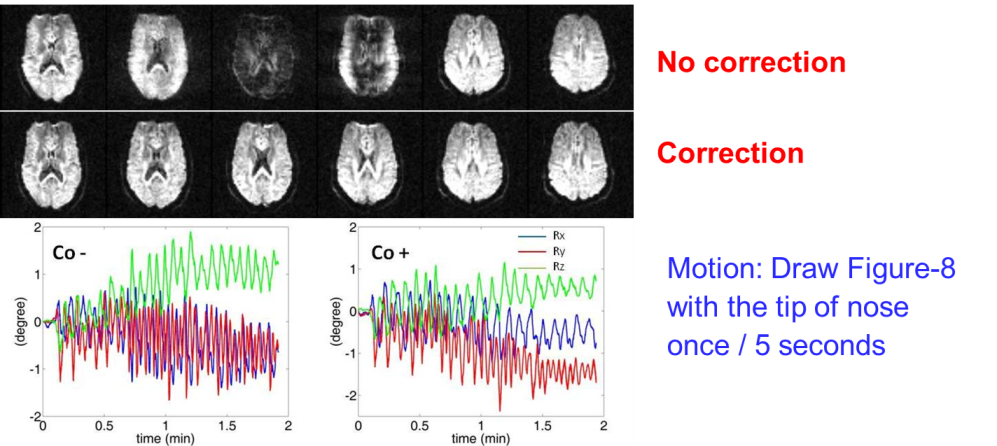Prospective Motion Correction for MRI
Return to Dr. Ernst's Laboratory
Goal
The goal of this multi-center NIH-funded Bioengineering Research Partnership (BRP) is to acquire artifact-free brain MR images in patients who move during scans.
Co-funded by NIDA and NIBIB: R01 DA021146
Axial brain MRI scans with head motion, without (left) and with (right) PMC
Elimination of signal dropouts by dynamic gradient rebalancing

From: Gumus K, Keating B, Poser BA, Armstrong B, Chang L, Maclaren J, Prieto T, Speck O, Zaitsev M, and Ernst T. Prevention of Motion-Induced Signal Loss in Diffusion-Weighted EPI by Dynamic Restoration of Gradient Moments. Magn Reson Med Jun;71(6):2006-2013 (2014). PMID: 23821373.
Major Achievements
- Developed MR compatible camera to track head motion at high speed (60 fps) with high accuracy (<0.1mm and <0.1°)
- Developed methods to apply MR sequence updates in real-time.
- Implemented PMC for structural MRI, BOLD fMRI, and MR spectroscopy (MRS)
- Elimination of signal dropouts during diffusion tensor imaging (DTI)
- Commercialization by KinetiCor Inc
Project Members
Principle Investigator:
Thomas M. Ernst, PhD
Professor, Department of Diagnostic Radiology and Nuclear Medicine,
University of Maryland School of Medicine
Co-Principle Investigators:
Oliver Speck, PhD
Department of of Physics,
University of Magdeburg, Germany
Maxim Zaitsev, PhD
Medical Physics, Department of Radiology,
University of Freiburg, Germany
Publications
Please refer Dr. Ernst's faculty profile for highlighted publications.
